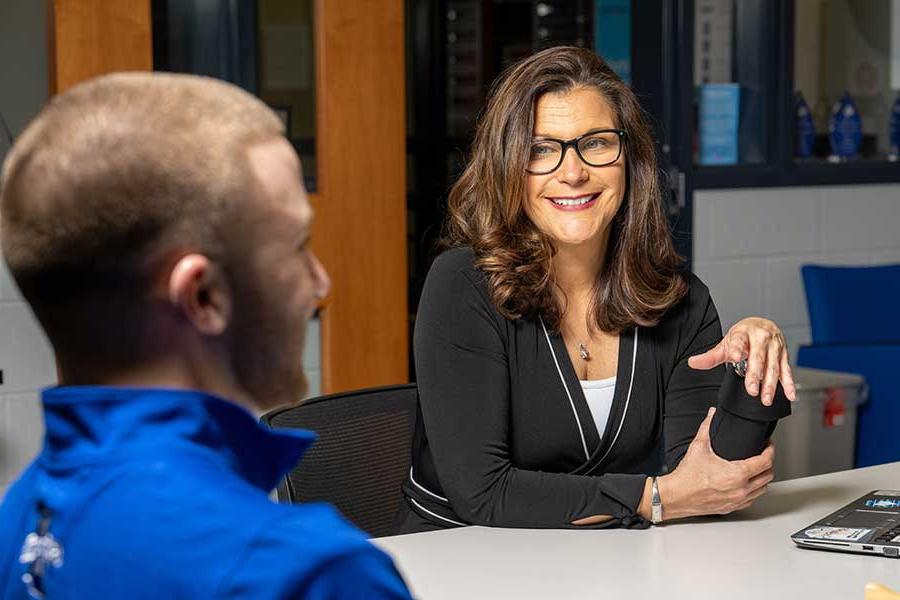Why Earn a Bachelor’s Degree in Architectural Engineering Technology at Indiana State?
The Architectural Engineering Technology degree program provides detailed instruction combining an understanding of the philosophy of building design with applied technical knowledge of construction systems and materials acquired in a technical-oriented classroom and lab structure.
Our architectural engineering technology program was the first of its kind in the state of Indiana.

Design Your Future
As an architectural engineering technology major at Indiana State University, you will gain the technical and managerial skills necessary for a career in the planning, design, construction, operation, and maintenance of built structures. With immersive classes, laboratory work, cooperative practice programs, and internships with industry employers, you will develop detailed expertise in all aspects of architectural and construction technology.
Learn from Our Excellent Faculty
Indiana State's instructors in the Department of Built Environment have industry experience in the areas of science, engineering, and technology. They are creative problem solvers and understand the demands of architectural engineering technology careers. They will guide your work on projects and assist you in mastering the skills and competencies you will need for a successful career.
Our small class sizes give you the chance to work one-on-one with your professors. As part of our commitment to experiential learning, instructors will assist you in securing field practicum experiences and internships to gain hands-on experience as an architectural engineering technologist.
Receive Expert Assistance in Our Labs
Practice your skills in our state-of-the-art learning laboratories and studios equipped with individual computer workstations. The labs offer computer-aided drafting, virtual computer models, Building Information Modeling [BIM], and computer imaging. Collaborate with your peers on projects while you learn to analyze and design systems, specify project methods and materials, perform cost estimates and analyses, and manage technical activities for projects.
What You'll Learn in the Architectural Engineering Technology Program
The BS in architectural engineering technology includes technical courses, managerial electives, mathematics, and science. You will utilize a variety of graphic tools and encounter a wide range of software programs, graphic communication techniques, and other problem-solving skills.
You will choose from courses such as architectural graphics, construction surveying, environmental control systems, residential design and construction, and sustainable practices.

Transfer Credit
Indiana State University accepts credit from regionally accredited colleges and universities within the United States, and from selected schools located outside the United States. Credit also may be granted for military training and experience. Previously earned college credit can be applied toward completion of the program per Indiana State's transfer guidelines.
Transfer GuidelinesCareer Possibilities for Architectural Engineering Technology Majors
A bachelor’s degree in architectural engineering technology from Indiana State prepares you to work as a highly technical draftsperson, technologist or manager for engineers, interior designers, construction managers, and facilities managers. Our program also prepares you to pursue a master’s degree in technology management and related fields.
Maximize Your Experience at Indiana State
Explore our Honors College to learn how you can maximize your college experience with faculty mentors, undergraduate research, internships, and Honors housing. Students in the Honors College also enjoy opportunities to travel across the nation and abroad for conferences, service-learning trips, and immersive academic and cultural studies.
Learn About the Honors CollegeAccreditation
Indiana State University is accredited by the Higher Learning Commission. The Architectural Engineering Technology undergraduate program is accredited by the Engineering Technology Accreditation Commission of ABET. http://www.abet.org
Program Educational Objectives (PEOs)
Below are the Program Educational Objectives (PEOs) that describe what graduates are expected to attain within a few years of graduation:
- PEO 1 Have been employed in architectural engineering technology-related fields;
- PEO 2 Communicate well, think creatively, and work effectively independently and/or in teams;
- PEO 3 Continue education and professional development; and
- PEO 4 Demonstrate ethical, social, and professional responsibility.
Student Outcomes (SOs)
Below are the Student Outcomes (SOs) that describe what graduates are expected to attain by the time of graduation:
(1) An ability to apply knowledge, techniques, skills and modern tools of mathematics, science, engineering, and technology to solve broadly defined engineering problems appropriate to the discipline;
(2) An ability to design systems, components, or processes meeting specified needs for broadly defined engineering problems appropriate to the discipline;
(3) An ability to apply written, oral, and graphical communication in broadly defined technical and non-technical environments; and an ability to identify and use appropriate technical literature;
(4) An ability to conduct standard tests, measurements, and experiments and to analyze and interpret the results to improve processes; and
(5) An ability to function effectively as a member as well as a leader on technical teams.
Related Programs
-

Construction Management (BS)
Bachelor's
-

Interior Architecture Design (BFA)
Bachelor's
